初中英语知识点总结2
初中英语鲁教版(五四制)九年级全册Unit 2知识点
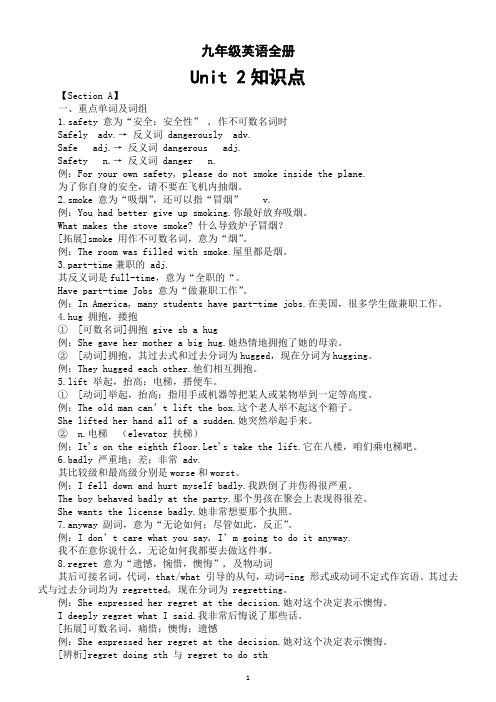
九年级英语全册Unit 2知识点【Section A】一、重点单词及词组1.safety 意为“安全;安全性” , 作不可数名词时Safely adv.→反义词 dangerously adv.Safe adj.→反义词 dangerous adj.Safety n.→反义词 danger n.例:For your own safety, please do not smoke inside the plane.为了你自身的安全,请不要在飞机内抽烟。
2.smoke 意为“吸烟”,还可以指“冒烟” v.例:You had better give up smoking.你最好放弃吸烟。
What makes the stove smoke? 什么导致炉子冒烟?[拓展]smoke 用作不可数名词,意为“烟”。
例:The room was filled with smoke.屋里都是烟。
3.part-time兼职的 adj.其反义词是full-time,意为“全职的“。
Have part-time Jobs 意为“做兼职工作”。
例:In America, many students have part-time jobs.在美国,很多学生做兼职工作。
4.hug 拥抱,搂抱①[可数名词]拥抱 give sb a hug例:She gave her mother a big hug.她热情地拥抱了她的母亲。
②[动词]拥抱,其过去式和过去分词为hugged,现在分词为hugging。
例:They hugged each other.他们相互拥抱。
5.lift 举起,抬高;电梯,搭便车。
①[动词]举起,抬高;指用手或机器等把某人或某物举到一定等高度。
例:The old man can’t lift the box.这个老人举不起这个箱子。
She lifted her hand all of a sudden.她突然举起手来。
现在分词知识点详解(初中英语专项复习)2
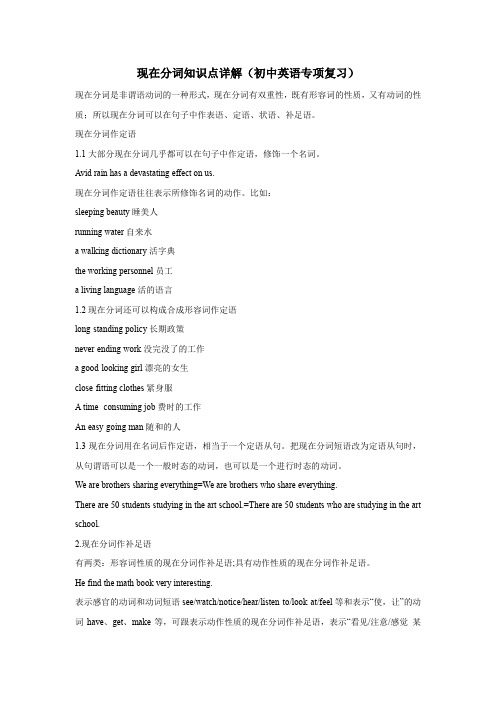
现在分词知识点详解(初中英语专项复习)现在分词是非谓语动词的一种形式,现在分词有双重性,既有形容词的性质,又有动词的性质;所以现在分词可以在句子中作表语、定语、状语、补足语。
现在分词作定语1.1大部分现在分词几乎都可以在句子中作定语,修饰一个名词。
Avid rain has a devastating effect on us.现在分词作定语往往表示所修饰名词的动作。
比如:sleeping beauty睡美人running water自来水a walking dictionary活字典the working personnel员工a living language活的语言1.2现在分词还可以构成合成形容词作定语long-standing policy长期政策never-ending work没完没了的工作a good-looking girl漂亮的女生close-fitting clothes紧身服A time -consuming job费时的工作An easy-going man随和的人1.3现在分词用在名词后作定语,相当于一个定语从句。
把现在分词短语改为定语从句时,从句谓语可以是一个一般时态的动词,也可以是一个进行时态的动词。
We are brothers sharing everything=We are brothers who share everything.There are 50 students studying in the art school.=There are 50 students who are studying in the art school.2.现在分词作补足语有两类:形容词性质的现在分词作补足语;具有动作性质的现在分词作补足语。
He find the math book very interesting.表示感官的动词和动词短语see/watch/notice/hear/listen to/look at/feel等和表示“使,让”的动词have、get、make等,可跟表示动作性质的现在分词作补足语,表示“看见/注意/感觉某人正在做某事”。
过去完成时知识点详解(初中英语专项复习) (2)
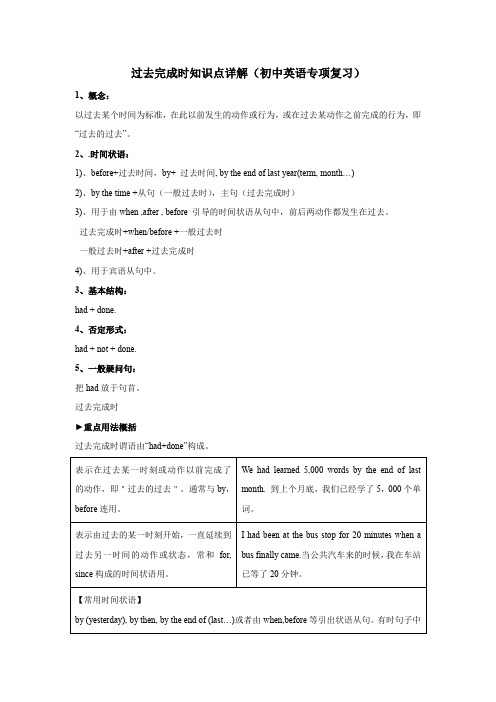
过去完成时知识点详解(初中英语专项复习)
1、概念:
以过去某个时间为标准,在此以前发生的动作或行为,或在过去某动作之前完成的行为,即“过去的过去”。
2、.时间状语:
1)、before+过去时间,by+ 过去时间, by the end of last year(term, month…)
2)、by the time +从句(一般过去时),主句(过去完成时)
3)、用于由when ,after , before 引导的时间状语从句中,前后两动作都发生在过去。
过去完成时+when/before +一般过去时
一般过去时+after +过去完成时
4)、用于宾语从句中。
3、基本结构:
had + done.
4、否定形式:
had + not + done.
5、一般疑问句:
把had放于句首。
过去完成时
►重点用法概括
过去完成时谓语由“had+done”构成。
初中英语语法知识点整理总结-动词2
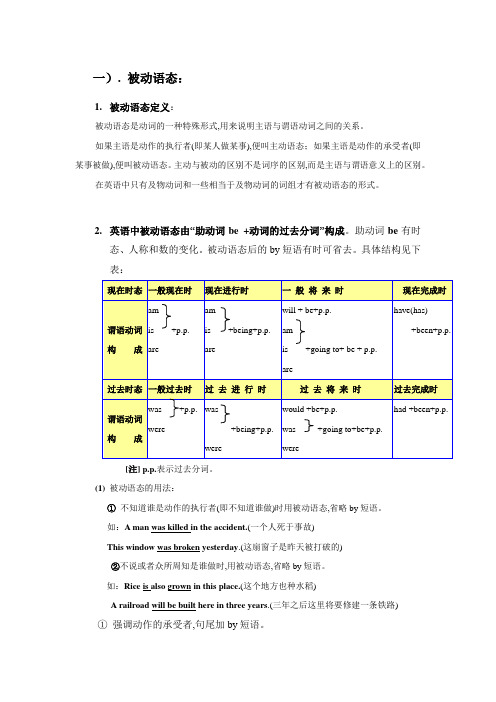
一).被动语态:1.被动语态定义:被动语态是动词的一种特殊形式,用来说明主语与谓语动词之间的关系。
如果主语是动作的执行者(即某人做某事),便叫主动语态;如果主语是动作的承受者(即某事被做),便叫被动语态。
主动与被动的区别不是词序的区别,而是主语与谓语意义上的区别。
在英语中只有及物动词和一些相当于及物动词的词组才有被动语态的形式。
2.英语中被动语态由“助动词be +动词的过去分词”构成。
助动词be有时态、人称和数的变化。
被动语态后的by短语有时可省去。
具体结构见下表:[注]p.p.表示过去分词。
(1) 被动语态的用法:①不知道谁是动作的执行者(即不知道谁做)时用被动语态,省略by短语。
如:A man was killed in the accident.(一个人死于事故)This window was broken yesterday.(这扇窗子是昨天被打破的)②不说或者众所周知是谁做时,用被动语态,省略by短语。
如:Rice is also grown in this place.(这个地方也种水稻)A railroad will be built here in three years.(三年之后这里将要修建一条铁路)①强调动作的承受者,句尾加by短语。
如:It was written by Lu Xun.(它(书)是鲁迅写的)A pet dog is never killed by its owner.(宠物狗是不会被主人宰杀的)(2)主动语态如何改写为被动语态:(3) 注意点:①“动词+间接宾语+直接宾语”改为被动时,可以用间接宾语做被动句的主语。
如:His teacher gave him a dictionary.→He was given a dictionary by his teacher.(老师给他一本字典→他得到老师一本字典)也可以用直接宾语做被动句的主语,但是需用to或者for引出原句的间接宾语。
Unit2知识点讲解人教版英语七年级下册

1.英语钟点时刻的表达在英语中,钟点时刻的表达除了用阿拉伯数字(如8:10,12:45)外,还可以用以下几种表达方式。
◆当时间是整点时,可用“钟点数+o'clock”来表达,其中o'clock可以省略。
如:6:00 → six (o'clock) 11:00 → eleven (o'clock)◆当时间不是整点时,表达方式有以下两种:1. 钟点数+分钟数。
如:9:08 → nine eight 14:40 → fourteen forty2. 分钟数+ past / to +钟点数1) 当分钟数小于30时,用“分钟数+ past +钟点数”表示“几点过几分”。
如:8:09 → nine past eight7:25 → twentyfive past seven2) 当分钟数大于30时,用“(60-分钟数) + to +下一个钟点数”表示“差几分到几点”。
如:11:40 → twenty to twelve 2:58 → two to three注意:在分钟数中,15分钟还可以用a quarter表示,30分钟还可以用half来表示。
如:11:15 → a quarter past eleven8:45 → a quarter to nine13:30 → half past thirteen◆ A.M.(a.m.)和P.M.(p.m.)在12小时制中,我们可以用A.M.(a.m.)和P.M.(p.m.)来区分上、下半天。
A.M.(a.m.)意为“午前、上午”; P.M.(p.m.)意为“午后、下午”。
如:早上六点半→ 6:30 a.m. / half past six in the morning中午十二点→ 12:00 p.m. / 12 o'clock in the daytime午夜十二点→ 12:00 a.m. / 12 o'clock at night / at midnight【运用】用两种方式写出下列时间的英语表达1. 2. 3.___________________ 或___________________ ___________________或______________________________________或___________________参考答案1. four thirty; half past four2. eleven five; five past eleven3. nine fifteen; a quarter past nine2. what time & when 引导的特殊疑问句what time和when均可对时间状语进行提问,用来询问什么时间。
初中九年级英语Unit 2知识点资料总结

初中九年级英语Unit 2知识点资料总结【重点词组或短语】1.so interesting如此有趣2.dress up装扮,穿上盛装3.go to someplace for a vacation去某地度假4.on vacation在度假5.put on穿上;增加体重6.be similar to...与……相似7.throw water at each other互相泼水8.a full moon满月9.carry people’s wishes to...寄托人们对……的祝福10.traditional folk stories传统的民间故事11.the most touching最令人感动的12.shoot down射下;击落13.live forever长生不老14.refuse to do sth.拒絕做某事15.fly up to...飞向……16.call out one’s name大声呼喊……的名字y out摆开;布置18.admire the moon赏月19.share...with...和……分享……20.steal...from...从……偷y eggs下蛋22.admire sb.for...因……而佩服某人23.tie...to...把……绑/系在……上24.as a result结果25.light candles点蜡烛26.cartoon characters卡通角色27.take/show...around...带领某人参观28.ask for treats要求请客29.play a trick on sb.捉弄某人30.give sb.a treat招待某人31.treat sb.to sth.请某人吃……32.the true meaning真谛,真正的含义33.the spirit of...……的精神34.a novel written by...由……写的小说35.care about关心;在乎36.business partner生意伙伴37.punish sb.for sth./doing sth因……惩罚某人38.warn sb.to do sth.告诫/警告某人做某事39.end up结束,告终40.give birth to生(孩子),生育;产生41.not only...but also不仅……而且……42.promise to do sth.承诺/答应做某事43.a mean person一个吝啬的人44.tell a lie撒谎【重难点句子】1.I wonder if it’s similar to the Water Festival of the Dai people in Yunnan Province.我想知道它是否与云南傣族的泼水节相似。
人教版初中英语新教材七年级上starterUnit2知识点归纳总结(复习必背)
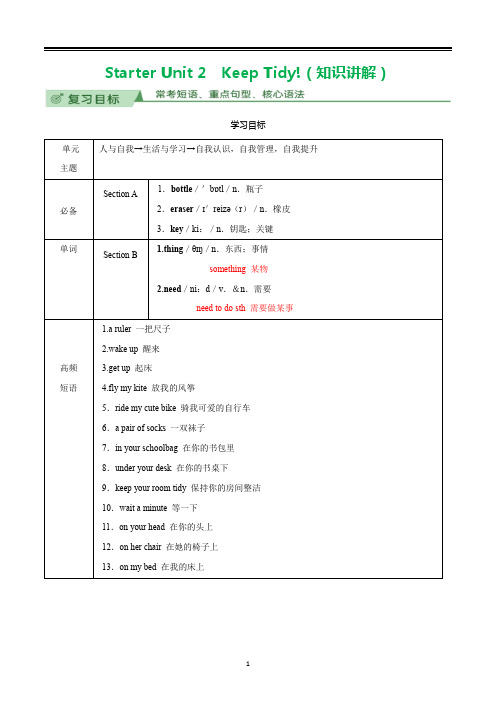
Starter Unit 2 Keep Tidy!(知识讲解)学习目标单元主题人与自我→生活与学习→自我认识,自我管理,自我提升必备Section A1.bottle/'bɒtl/n.瓶子2.eraser/ɪ'reizə(r)/n.橡皮3.key/ki:/n.钥匙;关键单词Section B1.thing/θɪŋ/n.东西;事情something 某物2.need/ni:d/v.&n.需要need to do sth 需要做某事高频短语1.a ruler 一把尺子2.wake up 醒来3.get up 起床4.fly my kite 放我的风筝5.ride my cute bike 骑我可爱的自行车6.a pair of socks 一双袜子7.in your schoolbag 在你的书包里8.under your desk 在你的书桌下9.keep your room tidy 保持你的房间整洁10.wait a minute 等一下11.on your head 在你的头上12.on her chair 在她的椅子上13.on my bed 在我的床上常考句型1.询问拥有的物品:-What do you have in your schoolbag?你的书包里有什么?-I have a cap.我有一顶帽子。
2.What colour is /are...?询问颜色:-What colour is the cap?这顶帽子是什么颜色的?-It's...它是······-What colour are the rulers?这些尺子是什么颜色的?-They're...它们是······3.Is it on/in/under...?确定物品的位置:-Is it in your schoolbag?它在你的书包里吗?-No,it isn't.不,它不在。
七年级上册英语unit2知识点思维导图

七年级上册英语unit2知识点思维导图英语是世界上使用第二多的语言,掌握好英语可以带给我们很多便利。
在初中阶段,我们需要认真学习英语,打下好的基础。
这篇文章将会带你了解七年级上册英语Unit2的知识点思维导图,帮助你更好、更快地掌握这个单元的内容。
一、Unit2的主要话题:人称代词(Personal Pronouns)Unit2的主要话题是人称代词,它是句子中最常用的一类代词,用来代替主语、宾语等。
人称代词分为主格、宾格、物主代词、反身代词等,我们可以利用思维导图来理顺它们之间的关系以及用法。
二、主格人称代词(Subjective Personal Pronouns)在句子中,主语是动作的执行者,主格人称代词就用来代替主语。
主格人称代词包括I、you、he、she、it、we、they。
在思维导图中,我们可以把主格人称代词作为中心,把它们代表的人物分别连接起来。
三、宾格人称代词(Objective Personal Pronouns)在句子中,宾语接受动作的影响,宾格人称代词就用来代替宾语。
宾格人称代词包括me、you、him、her、it、us、them。
在思维导图中,我们可以把宾格人称代词作为中心,把它们代表的人物分别连接起来。
四、物主代词(Possessive Personal Pronouns)物主代词用来表示所属关系,包括我的(my)、你的(your)、他的(his)、她的(her)、它的(its)、我们的(our)、他们的(their)。
在思维导图中,我们可以把物主代词作为中心,把它们代表的人物和所属的物品、事物连接起来。
五、反身代词(Reflexive Pronouns)反身代词用来表示动作的执行者和宾语是同一个人,包括myself、yourself、himself、herself、itself、ourselves、themselves。
在思维导图中,我们可以把反身代词作为中心,把它们代表的人物和所执行的动作连接起来。
(完整word版)初中英语语法大全[知识点总结 (2)
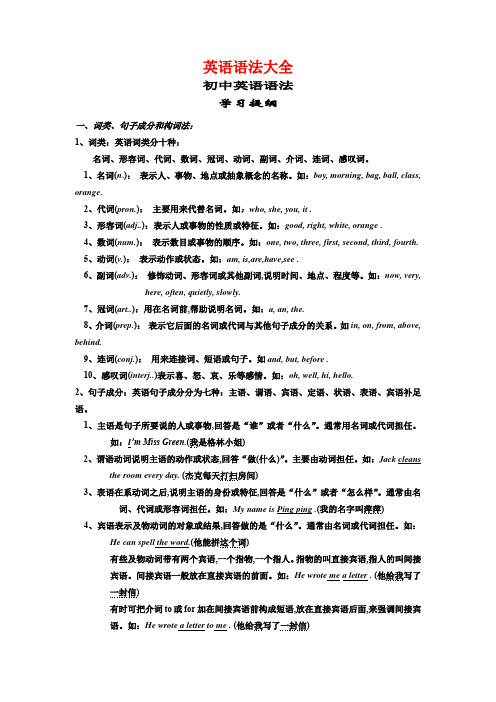
英语语法大全初中英语语法学习提纲一、词类、句子成分和构词法:1、词类:英语词类分十种:名词、形容词、代词、数词、冠词、动词、副词、介词、连词、感叹词。
1、名词(n.):表示人、事物、地点或抽象概念的名称。
如:boy, morning, bag, ball, class, orange.2、代词(pron.):主要用来代替名词。
如:who, she, you, it .3、形容词(adj..):表示人或事物的性质或特征。
如:good, right, white, orange .4、数词(num.):表示数目或事物的顺序。
如:one, two, three, first, second, third, fourth.5、动词(v.):表示动作或状态。
如:am, is,are,have,see .6、副词(adv.):修饰动词、形容词或其他副词,说明时间、地点、程度等。
如:now, very,here, often, quietly, slowly.7、冠词(art..):用在名词前,帮助说明名词。
如:a, an, the.8、介词(prep.):表示它后面的名词或代词与其他句子成分的关系。
如in, on, from, above, behind.9、连词(conj.):用来连接词、短语或句子。
如and, but, before .10、感叹词(interj..)表示喜、怒、哀、乐等感情。
如:oh, well, hi, hello.2、句子成分:英语句子成分分为七种:主语、谓语、宾语、定语、状语、表语、宾语补足语。
1、主语是句子所要说的人或事物,回答是“谁”或者“什么”。
通常用名词或代词担任。
如:I’m Miss Green.(我是格林小姐)2、谓语动词说明主语的动作或状态,回答“做(什么)”。
主要由动词担任。
如:Jack cleansthe room every day. (杰克每天打扫房间)3、表语在系动词之后,说明主语的身份或特征,回答是“什么”或者“怎么样”。
初中英语新人教版七年级上册Unit 2 We're family知识点讲解(2024秋)

七年级英语上册Unit 2 We're family知识点【Useful expressions】come in 进来ping-pong bat 乒乓球拍play ping-pong together 一起打乒乓球every day 每天fishing rodspend a lot of / lots of time fishing 花很多时间钓鱼play the piano 弹钢琴play Chinese chess 下中国象棋play basketball 打篮球read a lot 阅读很多play with sb. 和某人一起玩in the playground 在操场上have fun 玩得高兴in the photo 在照片中a photo of... 一张...的照片on the left/right 在左 / 右边read sb. a story 给某人读故事at night 在夜晚in the middle 中间;中部next to紧邻;在……近旁say the same thing to all of us 对我们所有人说同样的话go hiking 远足;徒步旅行the same as 和...一样show great respect to sb. 对某人表示极大的尊敬change... to... 把...换成...live on 继续存在allow sb./sth. to do sth. 允许某人/某物做某事come up with 想出,提出the meaning of ...的意思family tie 家庭纽带【Target sentences】These ping-pong bats are nice. Whose are they?This is my ping-pong bat, and the black / red one is my grandpa's. ---Whose fishing rods are those?---They're my father's.He spends a lot of / lots of time fishing.She can play it really / very well!---whose erhu is this?--- It's Xinyu's erhu.7.---Does she play the erhu well?---Yes, she does.8.They have some nice ping-pong bats.9.---Do you play the piano?---Yes, i do./ No, l don't.10.---Does your father spend a lot of time fishing?---Yes, he does./ No, he doesn't.11.My brother is tall, and he has short hair.12.We are all different, but we have a lot of fun together.13.How many people are there in your family?14.Who are they and what are they like?16.Here's a photo of us.【Language points】1.---Whose fishing rods are those?---They're my father's.(1)whose 对物主提问 ,意为“谁的”; 常用提问句式:Whose +名词(单数)+is +this/that?Whose +名词(复数)+are these/those?Whose is this/that + 名词(单数)?Whose are these/those + 名词(复数)?(2)they 人称代词指代fishing rods.(3)my father's 名词所有格:我父亲的2.They have some nice ping-pong bats.(1) have v.有;作及物动词,意为“有”,其第三人称单数形式是has。
初中英语语法大全[知识点总结(2)

初中英语语法总结人称代词:人称代词代替人和事物的名称,分为主格和宾格两种形式。
物主代词:说明事物所属关系的代词,分为形容词性和名词性两种。
some和an的用法:_some一般用于肯定句中,意思是“几个”“一些”、“某个”作定语时可修饰可数名词或不可数名词some用于疑问句时,表示建议、请求或希望得到肯定回答。
any一般用于疑问句或否定句中,意思是“任何一些”、“任何一个”,作定语时可修饰可数或不可数名词。
any用于肯定句时,意思是“任何的”。
al禾口both的用法:all指三者或三者以上的人或物,用来代替或修饰可数名词;也可用来代替或修饰不可数名词。
both指两个人或物,用来代替或修饰可数名词。
all和both在句子中作主语、宾语、表语、定语等。
"和both既可以修饰名词(aU/both+(the)+名词),也可以独立使用,采用“alboth+ofthe+名词(复数)”的形式,其中的of可以省略。
eveyy禾口each用法:every是形容词,只能作定语修饰单数名词,意思是“每一个”,表示整体概念;each是形容词、代词,可用作主语、宾语、定语等意思是“每个”或者“各个”,表示单个概念;each 可以放在名词前,可以后跟of短语,与动词同时出现时要放在“be动词、助动词、情态动词”之后或者行为动词之前every和each都用作单数理解,但是下文中既可以用单数的代词(如he/him/his)也可以用复数的代词(如they/them/their)替代。
eiher和neither的用法:either意思是“两个中间的任何一个”neither是either的否定形式,意思是“两个都不”neither和either在句子中可作主语、宾语和定语等,都用作单数。
other、theother禾口another的用法:other意思是“另一”、“另一些”,有复数形式。
在句子中可作主语、宾语和定语。
another意思是“另外”、“又一个”,表示增加,在句中可作宾语和定语。
初中英语人教新目标九年级全一册unit2知识点

九年级英语全一册unit2知识点【重点单词】1.relative n.亲属;亲戚;adj.相对的;相关联的be relative to sth.与...相关的2.treat v.招待;请(客); n.款待;招待treat sb.with...用/以...对待某人【重点短语】1.the Lantern Festival元宵节2.the Dragon Boat Festival 端午节3.the Water Festival泼水节4.remind sb.of sth.使某人想起某事5.eat five meals a day一天吃五餐6.put on five pounds 体重增加了五磅7.treat sb.with sth用/以……对待某人8.be similar to...与.......相似9.end up最终成为/处于10.share sth.with sb.与……分享……11.as a result结果12.one...the other... (两者中的) 一个…另一个…13.take sb.out for dinner带某人出去吃饭14.dress up 乔装打扮15.haunted house鬼屋16.the beginning of new life 新生命的开始17.be fun to watch 看着很有意思18. in two weeks 两星期之后19.put on 增加(体重);发胖20. care about 关心;在乎21.not only...but also...不但……而且......22. shoot down 射下ed to do sth 过去常常做……24. give out 分发;发放25.in the shape of sth 以......的形状26. fly up to 飞向y out 摆开;布置28. as a result 结果;因此29.think of 想起;认为;思考30. dress up 盛装打扮31.make money 挣钱32. in need 需要帮助;处于困境中33.call out 大声呼喊34. shoot down 射下【重点句型】1.I think that they’re fun to watch.我认为它们看着很有意思。
仁爱版英语八年级unit2知识点总结
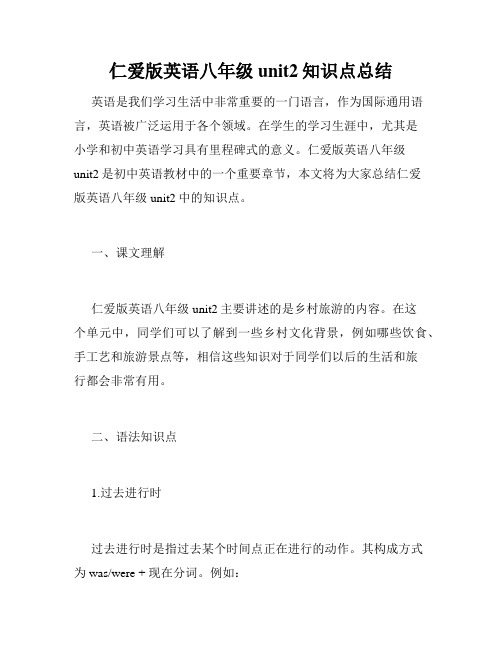
仁爱版英语八年级unit2知识点总结英语是我们学习生活中非常重要的一门语言,作为国际通用语言,英语被广泛运用于各个领域。
在学生的学习生涯中,尤其是小学和初中英语学习具有里程碑式的意义。
仁爱版英语八年级unit2是初中英语教材中的一个重要章节,本文将为大家总结仁爱版英语八年级unit2中的知识点。
一、课文理解仁爱版英语八年级unit2主要讲述的是乡村旅游的内容。
在这个单元中,同学们可以了解到一些乡村文化背景,例如哪些饮食、手工艺和旅游景点等,相信这些知识对于同学们以后的生活和旅行都会非常有用。
二、语法知识点1.过去进行时过去进行时是指过去某个时间点正在进行的动作。
其构成方式为 was/were + 现在分词。
例如:She was walking her dog.They were playing basketball.2.现在完成时现在完成时用来表达过去某个时间到现在的延续性动作,其构成方式为 have/has + 过去分词。
例如:I have lived in this city for 5 years.She has finished her homework.3.比较级和最高级比较级用来表示两者中的大小或者多少的关系,最高级是三个或三个以上事物的中最大或最小或最高的程度。
其构成方式为在形容词后加 er/est 或 more/most。
例如:Tom is taller than his sister.This is the most interesting book I’ve ever read.三、常见单词1.tractor 拖拉机2.farm 农场3.crop 庄稼4.harvest 收割5.tourist 旅游者6.crafts 手工艺品7.needle 针8.thread 线9.spoon 勺子10.cottage 小屋四、重点词组1. have a good time 玩得开心2. come up with 想出3. take place 发生4. be interested in 对……感兴趣5. be famous for 因……而出名6. be located in 位于7. be proud of 为……感到自豪8. be known as 被称作五、重点句型1. What were you doing at 4 o’clock yesterday afternoon?2. We have never visited any countryside before.3. The farm girl was milking a cow when we got there.4. We’ve been here for only three days, but we’ve already seen a lot and have had a great time.5. At night, we talk about the things we’ve seen and done, and we all agree that this has been one of the best vacations we’ve ever had.六、练习习题为了帮助同学们更好的掌握仁爱版英语八年级unit2的知识,下面提供一些练习习题:1. They _____ in the countryside for three days.A. are stayingB. have stayedC. will stayD. stayed2. The rice fields are beautiful _______ you see them.A. whenB. becauseC. unlessD. that3. _____ did you visit last weekend?A. WhatB. WhenC. WhereD. Why4. The village is famous _____ its handmade crafts.A. withB. forC. atD. in5. When I arrived, she _______ TV.A. watchesB. watchedC. was watchingD. is watching本文主要总结了仁爱版英语八年级unit2的知识点,包括课文理解、语法知识点、常见单词、重点词组、重点句型和练习习题等内容。
初中英语人教新目标八年级上册Unit 2 重要知识点(重点语块+词形变换+重点句子)

八年级英语上册Unit 2重要知识点Section A【重点语块】1.how often多久一次2.go to the movies看电影3.help with housework 帮忙做家务4.go shopping去购物5.hardly ever几乎从不6.once a week每周一次7.three times a week 一周三次8.twice a month一个月两次e the Internet上网10.what kind of什么种类11.swing dance摇摆舞12.stay up late熬夜13.play sports做运动14.at least至少,不少于;起码15.go to bed early早点睡觉16.eat a healthy breakfast 吃健康的早餐17.be full of...充满……18.my favorite program我最喜欢的节目【词形变换】1.hardly adv.几乎不;几乎没有→hard adv.努力地 adj.困难的;艰苦的2.exercise n.锻炼;练习→exercise v.锻炼;运动3.once adv.一次;曾经→one num.(基数词)一;一个→first num.(序数词)第一4.twice adv.两次;两倍→two num.(基数词)二;两个→second num.(序数词)第二5.least adv.& adj.最小(的);最少(的)→ little adv.& adj.小(的);少(的)→less adv.&adj.更小(的);更少(的)6.swing n.摆动;秋千v.(使)摆动;摇摆→swung(过去式)【重点句子】1.—What do you usually do on weekends?I often go to the movies.—你周末通常做什么?—我经常去看电影。
八年级上册英语2b知识点总结
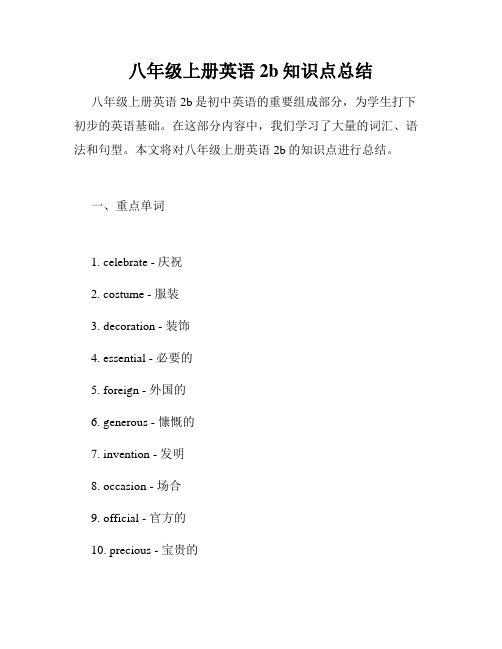
八年级上册英语2b知识点总结八年级上册英语2b是初中英语的重要组成部分,为学生打下初步的英语基础。
在这部分内容中,我们学习了大量的词汇、语法和句型。
本文将对八年级上册英语2b的知识点进行总结。
一、重点单词1. celebrate - 庆祝2. costume - 服装3. decoration - 装饰4. essential - 必要的5. foreign - 外国的6. generous - 慷慨的7. invention - 发明8. occasion - 场合9. official - 官方的10. precious - 宝贵的二、重点语法1. 连词连接两个或更多的单词、短语或从句。
常见的连词有and、but、or、so等。
例句:He likes to play basketball, but he doesn't like to watch it.2. 时态时态分为现在时态、过去时态和将来时态,每个时态还分为简单、进行和完成时态。
例句:She is reading a book right now.(现在进行时)3. 主语和谓语主语是句子中的主要名称、代词或其他名称,而谓语则描述主语的动作或状态。
例句:The baby is sleeping peacefully.(主语是baby,谓语是is sleeping)4. 祈使句祈使句是用来表示命令或请求的句子。
通常不包含主语,用动词原形开头。
例句:Sit down, please.(请坐)三、重点句型1. There be句型There be句型用来表述某个地方有什么东西或人。
主语用there,谓语用be动词。
例句:There is a cat in the garden.(花园里有一只猫)2. It is/was…that句型It is/was…that句型用来强调某个人或物是重要的、有趣的或有价值的。
例句:It was the best trip that I have ever had.(这是我有过的最好的旅行)3. 动名词和不定式的用法动名词和不定式都有名词和动词的特征。
指示代词知识点详解(初中英语专题复习)2
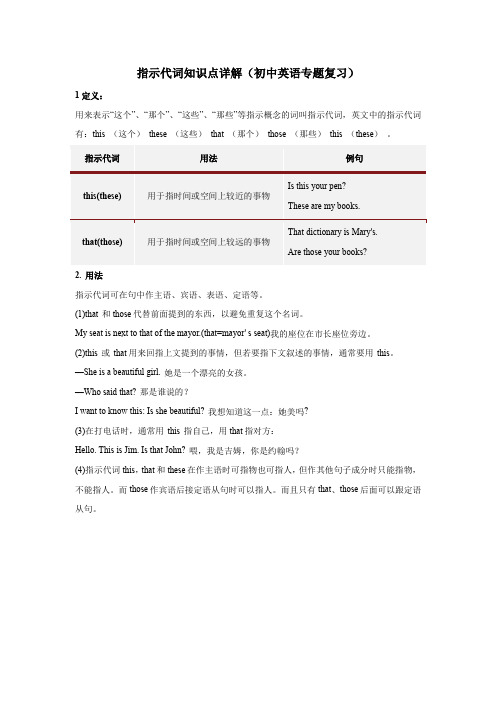
指示代词知识点详解(初中英语专题复习)
1定义:
用来表示“这个”、“那个”、“这些”、“那些”等指示概念的词叫指示代词,英文中的指示代词有:this (这个)these (这些)that (那个)those (那些)this (these)。
2. 用法
指示代词可在句中作主语、宾语、表语、定语等。
(1)that 和those代替前面提到的东西,以避免重复这个名词。
My seat is next to that of the mayor.(that=mayor' s seat)我的座位在市长座位旁边。
(2)this 或that用来回指上文提到的事情,但若要指下文叙述的事情,通常要用this。
—She is a beautiful girl. 她是一个漂亮的女孩。
—Who said that? 那是谁说的?
I want to know this: Is she beautiful? 我想知道这一点:她美吗?
(3)在打电话时,通常用this 指自己,用that指对方:
Hello. This is Jim. Is that John? 喂,我是吉姆,你是约翰吗?
(4)指示代词this,that和these在作主语时可指物也可指人,但作其他句子成分时只能指物,不能指人。
而those作宾语后接定语从句时可以指人。
而且只有that、those后面可以跟定语从句。
中考英语知识点总结(2)

初中复习资料 【初中英语词组总结】1 (see 、hear 、notice 、find 、feel 、listen to 、 look at (感官动词)+do eg:I like watching monkeys jump2(比较级 and 比较级) 表示越来越怎么样 小菜一碟(容易) 3 a piece of cake =easy 4 agree with sb赞成某人5 all kinds of 各种各样 a kind of 一样6 all over the world = the whole world整个世界7 along with 同……一道,伴随…… eg : I will go along with you 我将和你一起去 the students planted trees along with their teachers 8 As soon as9 as you can see 你是知道的学生同老师们一起种树 一怎么样就怎么样10 ask for ……求助 11 ask sb for sth 12 ask sb to do sth 13 at the age of向…要…(直接接想要的东西) 向某人什么 询问某人某事 在……岁时ask sb not to do 叫某人不要做某事14 at the beginning of …… ……的起初;……的开始 15 at the end of +地点/+时间最后;尽头;末尾16 at this time of year17 be /feel confident of sth /that clause +从句 18 be + doing 表:1现在进行时 2将来时 19 be able to (+ v 原) = can (+ v 原) 能够…… 21 be afraid to do (of sth 恐惧,害怕…… 在每年的这个时候 感觉/对什么有信心,自信22 be allowed to do 23 be angry with sb 被允许做什么 生某人的气24 be angry with(at) sb for doing sth为什么而生某人的气25 be as…原级…as和什么一样eg : She is as tall as me 她和我一样高26 be ashamed to27 be away from 28 be away from 29 be bad for 远离从……离开 对什么有害 30 be born出生于31 be busy doing sth 忙于做什么事 当心;小心 和什么不一样be busy with sth 忙于……32 be careful 33 be different from…… 34 be famous for以……著名35 be friendly to sb36 be from = come from 37 be full of 装满……的 is filled with water对某人友好 来自 be filled with 充满 eg: the glass is full of water the glass38 be glad+to+do/从句 39 be going to + v(原) 将来时40 be good at(+doing) = do well in在某方面善长,善于……41 be good for对什么有好处42 be happy to do 43 be helpful to sb 44 be in good health45 be in trouble 很高兴做某事对某人有好处身体健康 处于困难中 46 be interested in 对某方面感兴趣47 be late for = come late to 迟到 eg: Be late for class上课迟到48 be like像……eg : I'm like my mother49 be mad at生某人的气50 be made from 由……制成(制成以后看不见原材料)51 be made of 由……制成(制成以后还看得见原材料) 52 be not sure 表不确定 53 be on a visit to 54 be popular with sb参观受某人欢迎55 be quiet安静56 be short for 57 be sick in bed 58 be sorry to do sth 表**的缩写 eg:陶 is short for 陶俊杰生病在床 be sorry for sbeg : I am sorry for you59 be sorry to hear that 60 be sorry to trouble sb 61 be strict in doing 62 be strict with sbsth严于做某事对某人要求严格63 be strict with sb in sth64 be supposed to do 65 be sure 表确定某方面对某人严格 被要求干什么 66 be sure of doing sth 对做某事有信心 67 be sure of sth对做某事有信心 对做某事有信心 68 be sure that sth 69 be sure to do sth 一定会做某事 We are sure to learn English well 我们一定能学好英语 70 be terrified of +名/动 doing 害怕…… 71 be terrified to do sth 72 be the same as …害怕做某事 和什么一样73 be used to doing sth 习惯做某事 My father is used to getting up early74 be worth doing 值得做什么我爸爸习惯早 75 be(feel) afraid to do sth 害怕做某事 be afraid of sth 害怕某物 be afraid that 丛句 76 because+句子 because of +短语eg : He was late because he had a headache 77 begin to do = start to do 开始做某事 start…with…=begin…with…以什么开始什么 78 between…and…He was late because of his headache 两者之间79 borrow sth from sb 向……借…… lend sth to sb ( lend sb sth 借给……什么东西80 both = the same(as) = not different(from) 81 bother 打扰 bother sb to do sth表相同eg : I'm sorry to bother you ,but can you tell me to way to the station我十分道歉打扰你,但是你能告诉我怎么去车站 82 by the end of 83 call sb sth到……为止eg : We call him old wang85 catch up with sb 86 chat with sb 赶上某人 和某人闲谈 进 过来 take sb to +地点带某人去某地87 come in 88 come over to 89 come up with 法吗?提出eg: Can you come up with a good idea你能想出一个好办90 communicate with sb 和某人交流 91 consider + doing 考虑做什么 eg : Why not consider going to lu zhou为什么不考虑去泸州? 92 dance to随着……跳舞93 decide to do sth 决定做某事 94 do a survey of95 do better in 做某方面的调查 在……方面做得更好 96 do wrong 97 Don't forget to do sth98 Don't mind +doing /从句 /名词 做错 不要忘了做某事不要介意……99 each +名(单)每一个…eg : Each student has many books100 end up +doing 每一个学生都有一些书101 enjoy +doing 喜欢 102 escape from 从……逃跑103 expect to do sth 104 fall down 摔下来 fall off 105 fall in love with sb /sth 106 far from107 find +it +adj +to do 发现做某事怎么样期待做某事 从哪摔下来 爱上什么 离某地远108 find sb/sth +adj 发现什么怎么样 eg : I find the book interesting 109 finish 完成+doing (名词)110 fit to sb = be fit for sb 111 forget to do 没有做而忘了 112 from…to… 适合某人 forget doing 做了而又忘了从某某到某某eg: From me for her113 get /have sth down 做完,被(别人)做…eg: I have my hair cut我理了发(头发被剪了)Tom got his bad tooth pulled out汤母把他的坏牙拔掉了(被牙医拔掉了)114 get a part-time job= find a part-time job115 get along well with sb = get on well with sb116 get along with sb = get on with sb 与某人相处 117 get ready for = be ready for 为什么而准备 与某人相处得好 118 get sb in to trouble120 get…from…从某处得到某物 121 give a talk 122 give sth to sb give sb sth给某人带来麻烦 做报告给某人某物123 go fish 钓鱼 go swimming 游泳124 go on to do去做下一件事 go on doing 继续做这件事125 go out away from 远离go out of 从….离开126 go to school 上学(用于专业的)go to the school 去学校(不一定是上学) 127 good way to 128 hate to do 好方法讨厌没做过的事hate doing讨厌做过的事129 have a party for sb130 have a talk 131 have been doing 现在完成进行时 举办谁的晚会 听报告 谈一谈 132 have been to …( 还没回来地方)……去过某过地方 ha ve gone to …(地方) 去了某地133 have fun +doing 134 have sth to do 135 have to do sth玩得高兴 有什么事要做必须做某事 136 have trouble (problem) (in) doing sth 137 have…time +doing 做什么事情有麻烦138 have…(时间)…off 放……假139 hear sb +do/doing听见某人做某事/正在做某事 140 help a lot很大用处141 help sb with sth \one's sth某人做某事 帮助某人某事(某方面) help sb (to) do sth帮助142 hope to do sth希望做某事143 How about(+doing) = What about(+doing) 144 how do you like = what do you think of 你对什么的看法145 if :是否=wethereg: I don't know if (wether) I should go to the party 我不知道我是否应该去参加晚 会He don't know if (wether) we will arrive on timetomorrow morning他不知道我们明天早上是否能准时到达146 if :如果,假如(全部接一般时态)+条件语态从句eg:I'll go to LuZhou if it does't rain 假如明天不下雨,我就去泸州If they change the plan they will let me know 假如他们要改变计划,他们会让我知道的I'll go to England ,if I have enough money next year 如果我明年由足够的钱,我就要去英国147 in one's opinion = sb think 某人认为 148 in some ways 在某些方面 149 in the end = finally(adv)最后150 in the north of… 什么在什么的北方(north 北sowth 南west 西east 东)151 in the sun 152 increase 在太阳下 增加 eg : They've increased the prece of petrol by 3% 他们把石油价增加了 3%153 instead of+(名)代替eg:I'd like an apple instead of a pear我想要苹果,而不要梨子 154 introduce sb to sb 介绍某人给某人 邀请某人做某事introduce oneself自我介绍155 invite sb to do sth156 It takes sb sometime to do sth 做某人花掉某人多少时间eg : It took me 5 minutes to do my homework It takes me half an hour to cook157 It's +adj +for sb to do sth 对某人来说做某事怎么样 158 It's +adj +to do 做某事怎么样 159 It's +adj for sb 对于某人来说怎么样It's+adjofsb对某人来说太怎么样160 It's +adj(for sb) to do (对某人来说)做某事怎么样 It's +adj of sb to dosth对某人来说做某事太怎么样eg : It's nice of you to help me with my English161 It's a good idea for sb to do sth 162 It's important to sb 对某人来说很重要 163 It's time to do sth It's time for stheg : It's time to have class 164 join = take part in 165 just now 166 keep +sb /sth +adj /介词短语对…… 来说是个好主意 eg: It's important to me 到了该去做某事的时间It's time for class该去上课了参加刚才让什么保持什么样?167 keep out不让 ……进入168 keep sb adj 169 key to +名词 170 key to…让……保持…… keep healthy 保持健康 表示:某物的钥匙或某题的答案 anserto …key可以是答题或钥匙171 laugh at…取笑…… 172 learn by oneslfe 173 learn from sb 174 learn to do sth 175 let sb do sth 自学 向某人学习学做某事 让某人做某事让某人失望 176 Let sb downeg : We shouldn't let our farents down 我们不应该让我们的父母失望 177 live from :离某地远178 live in +大地方 /at +小地方 179 look after = take care of居住在某地照顾照看180 lose one's way 谁迷路181 make a decision to do sth 182 make friends with sb 决定做某事和谁成为朋友eg : I want to make friends with you 183 make it early 把时间定的早一点184 make on exhibition of oneself 185 make sb /n +n 让某人出洋相使什么成为什么eg : I made her my step moller I made you my wife186 make sb /sth +adjclean使某人(某物)怎么样eg : You must made your bed187 make sb /sth adj 188 make sb do sth使某人/某物怎么样让某人做某事189 make up be made up of (被动语态)由……组成190 make…difference 191 mind sb to do 192 most +名to…mind one's doingmost of +代介意……做什么193 much too +形容词194 must be 一定195 need +名词196 need sb do sth 需要某人做某事197 need to do (实义动词)198 no /neithr of hate to do 199 no +名词need do (情态动词)no /neithr of hate doing200 not anymore = no more 201 not… (形、副)at all 202 not…at all一点都不再也不……eg: He didn't cry any moreshe doesn't junp far at all eg: He's not tall at all203 not…either表否定,也不eg : I don't japanse either I don't have sister, either 我也没有姐姐204 not…until直到……才……205 offer / provide sb with sth 给某人提供206 offer sb sth ( offer sth to sb 提供什么东西给某人eg : I offer you water (I offer water to you 我给你提供水207 on one's way to…在谁去那的路上一方面208 on the one hand on the other hand 另一方面209 on the phone = over the phone 用电话交谈210 on time准时in time 及时211 one day=some day=someday212 one of +可数名词的复数形式一天,有一天213 one to another 一个到另一个214 over and over aginagin一遍又一遍的eg : He cleaned the floor over and over215 part-time job 兼职工作fall-time jobpay the bill 全职工作开钱216 pay for…付……钱,付钱217 please +do218 please help yourself 219 pleased with sb 220 pool into = pore into221 practice +doing 222 prefer sth to sth练习做某事相对……更喜欢……eg : I prefer physics to chemisty在物理和化学中,我更喜欢物理prefer sb not to do sth 223 pretend to do sth更愿意…eg: I prefer her not to come 我不喜欢她不来从句这两个骗子装着努力工作装着去做什么pretend thateg : The two cheats pretended to be working very hard224 rather…than宁可……也不……eg : I would rather be a doctor than a teacher 我愿肯当医生,也不当老师225 regard…as把……当作…… I regard you as my friendremid sb to do sth 我把你当作我的朋友提醒某人做某事226 remid sb about sth 提醒某人什么事eg : he remids me about cooking (he remids me to cook227 remid sb of sth使某人想起什么他提醒我做饭the words that (which) the teacher talke to remind me of my mother228 return sth to sb 229 say to oneself 还什么东西给某人对自己说230 say to sb对某人说231 sb spend somemoney on sth 花了多少钱在某事上232 sb spend sometime with sb 花了多少时间陪谁233 sb spend sometime(in) doing sth 花了多少时间做某事234 sb with sb +is 235 see sb dosb and sb +are看见某人做过某事see sb doing 看见某人正在做某事236 seem to do/be +adjseem to be happy显得怎么样eg : You seem to be tired You237 send +sb sth 送给某人某物238 send…to…把什么寄到哪里去?239 shock使……震惊eg : Oh , It's only you ! You give me a shock 啊,是你呀!吓我一跳240 show sb sth 向某人展示某物241 show sb sth = show sth to sb 拿什么东西给某人看242 show sth to sb向某人展示某物243 some…others…244 start…with…一些……另一些……从……开始远离……begin…with…从……开始245 stay away fromeg : We're told to stay away from the animals whe visiting the zoo时,我们要远离动物当我们参观 zoo 246 stop doing停下正在做的事247 stop sb from doing sth 248 stop sb(from) doing 阻止某人做某事阻止某人做某事249 stop to do 停下正在做的事去做下一件事 250 such +名251 suit sb 这样 ,这种 适合某人 252 surprise sb 253 take classes使某人惊奇 上课to one's surprise令某人惊奇254 take sb to 把某人带去 eg : I take you to the hospital255 take walks = take a walk = go for a walk 散步256①talk to 对谁说 ③ talk of 谈到 ② talk with ④ talk 和谁说about 谈论关于……257 talk with sb 258 teach sb sth和某人说话 教某人做某事259 tell sb do sth 告诉某人做某事 261 tell sb sth 告诉某人某事262 tell sb 〔not 〕 to do sth tell sb that 丛句tell sb not to do sth告诉某人做什么 263 tell…from… 264 thank you for +doing265 the same +名词(doing)+as……266 the same…(名)…as as…(adj adv)…as267 the way to do sth = the way of doing st 做某方面的方法the way to +地方 e g :Do you know the way to learn English区别 相同去哪的路Do you know the way of learningEnglish268 the way to…(地点) 270 transalte ……into…… 到哪的把什么翻译成什么 eg : Trasalte English into chinese 271 travel with sb 和某人去旅游272 try one's best to do sth 尽某人最大的努力去做某事 eg: I will try my best to learn English well273 try to do sth 274 try…试衣服 have a try 275 turn down 开小 ←→ turn up 276 turn off 关上 ←→ turn on 打开 open 想干什么,但没成功 try doing sth想干什么,已经做过了试一下 开大拆开 277 upside down278 visit to… 279 wait for sb倒着参观某个地方等某人 【比较 since 和 for 】Since 用来说明动作起始时间,for 用来说明动作延续时间长度。
- 1、下载文档前请自行甄别文档内容的完整性,平台不提供额外的编辑、内容补充、找答案等附加服务。
- 2、"仅部分预览"的文档,不可在线预览部分如存在完整性等问题,可反馈申请退款(可完整预览的文档不适用该条件!)。
- 3、如文档侵犯您的权益,请联系客服反馈,我们会尽快为您处理(人工客服工作时间:9:00-18:30)。
初中英语知识点总结2初一年级(下)【知识梳理】I. 重点短语1. a bottle of2. a little3. a lot (of)4. all day5. be from6. be over7. come back8. come from9. do one’s homework10. do the shopping11. get down12. get home13. get to14. get up15. go shopping16. have a drink of17. have a look18. have breakfast19. have lunch20. have supper21. listen to22. not…at all23. put…away24. take off25. throw it like that26. would like27. in the middle of the day28. in the morning / afternoon/ evening29. on a farm30. in a factoryII. 重要句型1. Let sb. do sth.2. Could sb. do sth.?3. would like sth.4. would like to do sth.5. What about something to eat?6. How do you spell …?7. May I borrow…?III. 交际用语1. —Thanks very much!—You're welcome. 2. Put it/them away.3. What's wrong?4. I think so.I don't think so.5. I want to take some books to the classroom.6. Give me a bottle of orange juice, please.Please give it / them back tomorrow. OK.9. What's your favourite sport?10. Don't worry.11.I’m (not) good at basketball.12. Do you want a go?13. That's right./ That‘s all right./ All right.14. Do you have a dictionary / any dictionaries? Yes, I do. / No, I don’t.15. We / They have some CDs.We / They don’t have any CDs.16. ---What day is it today / tomorrow?---It’s Monday.17. ---May I borrow your colour pens, please?---Certainly. Here you are.18. ---Where are you from?---From Beijing.19. What's your telephone number in New York?20. ---Do you like hot dogs?---Yes, I do. ( A little. / A lot. / Very much.)---No, I don't. ( I don't like them at all.)21. ---What does your mother like?---She likes dumplings and vegetables very much. 22. ---When do you go to school every day?---I go to school at 7:00 every day.23. ---What time does he go to bed in the evening?---He goes to bed at 10:00.IV. 重要语法1.人称代词的用法;2. 祈使句;3. 现在进行时的构成和用法;4.动词have的用法;5.一般现在时构成和用法;6.可数名词和不可数名词的构成和用法【名师讲解】1. That's right./ That‘s all right./ All right. That’s right意为“对的”,表示赞同对方的意见、看法或行为,肯定对方的答案或判断。
例如:"I think we must help the old man.""我想我们应该帮助这位老人。
""That's right."或"You're right.""说得对"。
That’s all right.意为“不用谢”、“没关系”,用来回答对方的致谢或道歉。
例如:"Many thanks." "That's all right.""Sorry. It's broken." "That's all right."All right.意为“行了”、“可以”,表示同意对方的建议或要求。
有时还可以表示“身体很好”"Please tell me about it." "请把此事告诉我。
""All right.""好吧。
"Is your mother all right?你妈身体好吗2. make/do这两个词都可以解释为“做”,但含义却不同,不能混用。
make指做东西或制东西,do指做一件具体的事。
Can you make a paper boat for me? 你能为我做个纸船吗?He’s doing his homework now.他正在做他的作业。
3. say/speak/talk/tellsay:是最口语化的最普通的一个词,意为“说出”、“说道”,着重所说的话。
如:“I want to go there by bus”, he said . 他说,“我要坐汽车到那里去。
”Please say it in English .请用英语说。
speak : “说话”,着重开口发声,不着重所说的内容,一般用作不及物动词(即后面不能直接接宾语) 。
如:Can you speak about him? 你能不能说说他的情况?I don’t like to speak like this. 我不喜欢这样说话。
speak 作及物动词解时,只能和某种语言等连用,表达在对话中恰当使用词汇的能力。
如:She speaks English well.她英语说得好。
talk : 与speak 意义相近,也着重说话的动作,而不着重所说的话,因此,一般也只用作不及物动词,不过,talk 暗示话是对某人说的,有较强的对话意味,着重指连续地和别人谈话。
如:I would like to talk to him about it . 我想跟他谈那件事。
Old women like to talk with children.老年妇女喜欢和孩子们交谈。
tell : “告诉”,除较少情况外,一般后面总接双宾语。
如:He’s telling me a story.他在给我讲故事。
tell a lie 撒谎tell sb. to do sth. /tell sb. not to do sth.Miss Zhao often tells us to study hard.4. do cooking/ do the cooking do cooking 作“做饭”解,属泛指。
do the cooking 特指某一顿饭或某一家人的饭。
cooking为动名词,不能用作复数,但前面可用some, much修饰。
从do some cooking可引出许多类似的短语:do some washing 洗些衣服do some shopping 买些东西do some reading 读书do some writing 写些东西do some fishing 钓鱼从以上短语可引申出另一类短语,不能用some, much或定冠词。
go shopping 去买东西go fishing 去钓鱼go boating 去划船go swimming 去游泳5. like doing sth./ like to do sth.like doing sth. 与like to do sth. 意思相同,但用法有区别。
前者强调一般性的爱好或者表示动作的习惯性和经常性;后来表示一次性和偶然性的动作。
例如:He likes playing football, but he doesn‘t like to play football with Li Ming.他喜欢踢足球,但是他不喜欢和李明踢。
6. other/ others/ the other/ anotherother表其余的,别的,Have you any other questions?你还有其他问题吗?others 别的人,别的东西In the room some people are American, the others are French.在屋子里一些人是美国人,其他的是法国人。
the other表另一个(二者之中)one…,the other…One of my two brothers studies English, the other studies Chinese.我两个哥哥中的一个学习英文,另一个学中文。
another表三者以上的另一个,另一些There is room for another few books on the shelf.书架上还可以放点书。
7. in the tree/ on the treein the tree 与on the tree.译成中文均为"在树上"但英语中有区别。
in the tree表示某人、某事(不属于树本身生长出的别的东西)落在树上,表示树的枝、叶、花、果等长在树上时,要使用on the tree.如:There are some apples on the tree. 那棵树上有些苹果。
